(Slides shared by a PBOT planner at the Bicycle Advisory Committee meeting last night.)
“PBOT will put treatments on 100 sections of neighborhood greenways by the end of next week.”
— Margaux Weeke, Office of Commissioner Chloe Eudaly
“We are officially in ‘go’ mode,” said a smiling Portland Bureau of Transportation’s Policy, Planning and Projects Group Manager Art Pearce at the outset of the Bicycle Advisory Committee meeting last night. The meeting was the first venue for PBOT to share more details about the ‘Slow Streets Safe Streets’ initiative they launched yesterday and what lies ahead.
So far the plan hasn’t been fully fleshed out; but last night’s meeting and a follow-up from Commissioner Eudaly’s office I just received this morning give us a much more detailed sense of where we’re headed.
And to be clear, despite what you might read from other media outlets, there are no plans for “promenades” and there are no plans to “close 100 miles of streets to car traffic.” The initiative announced yesterday would beef up existing neighborhood greenways by adding more diverters and signage — the same stuff we’ve done for years and that activists have pushed for all along. And the “100 miles of streets” is a big misunderstanding. Turns out PBOT plans to add new treatments to 100 sections of greenways — not miles (more on that below).
Yesterday’s announcement marked a big step forward for PBOT and commissioner-in-charge Chloe Eudaly.
Eudaly in particular has made a dramatic shift in her perspective in a very short timeframe. On April 16th, Eudaly told the PBOT Budget Advisory Committee, “I’m really not seeing overcrowding. We don’t need the streets closed.” And on April 20th, Eudaly said on an OPB radio show, “I don’t think that right now while we’re under ‘Stay at Home stay safe’ orders, that encouraging people to leave their homes and making radical changes with the way streets are used, are the best use of our time and resources.” She had also cited concerns about equity and risks from speeding drivers. But yesterday she had a much different tone, telling told KATU-TV that, “[People are] moving around their neighborhoods on foot and on bike and we need to make that easier and safer for them to do [so].”
What a difference a few weeks makes! Now PBOT and Eudaly are ready to roll. Last night PBOT’s Art Pearce said he and his staff have spent about a month tracking other cities’ responses to COVID-19. Pearce was clearly excited that he and his staff finally got the green light from the commissioner’s office to go public with their ideas. “It’s taken some time to get our feet beneath us,” he said, “now we’re ready to dive in with your help.”
So let’s dive in shall we?
Advertisement
We Have a Chance to Change For The Better For Good
“We don’t have to just recover to where we were. We can recover to where we want to be.”
— Nick Falbo, PBOT
Throughout the meeting Pearce and other PBOT staff hinted they see this initiative as much more than a short-term reaction to a crisis. “We’re looking for your help,” he told committee members, “to make sure we’re thinking about this comprehensively and thinking about this from the lasting impact it can be on our response as an agency and on our use of infrastructure and our streets.”
With car use and vehicle miles traveled down dramatically (as much as 60% fewer car trips in inner neighborhoods and 30% further out, according to PBOT data shared last night), PBOT is poised to seize the moment and hasten their work toward building a future where fewer people drive cars.
PBOT Senior Planner Nick Falbo has been tapped as the architect of the Slow Streets initiative. At the meeting last night he said PBOT is, “keeping our eyes on the prize about the future.” “It’s not just about what happens now… We want to emerge to a better future. We don’t have to just recover to where we were. We can recover to where we want to be,” he said.
“We have a rare moment to mobilize our bureau and enter this phase with eyes wide open; to plan for what’s happening next,” Falbo added.
Greenways Will Be Ground Zero
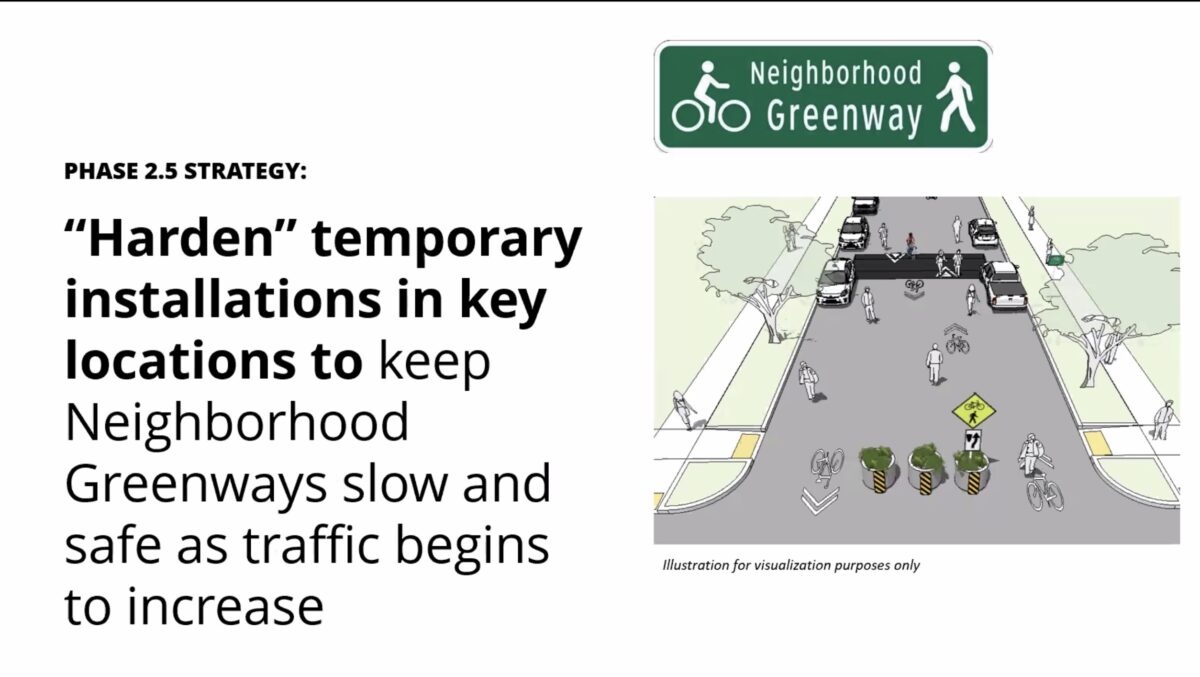
The most immediate work will come in the form of temporary barricades and diverters followed by more robust “hardening” of existing neighborhood greenways.
In response to our questions this morning, Eudaly’s office just released new information about how this will be rolled out. PBOT has identified 100 neighborhood greenway locations (not miles) where they’ll place temporary diversion and other treatments by the end of next week. “These are locations where greenways intersect with busy streets and have historic high traffic volumes,” Eudaly’s office says. Commissioner Eudaly will publish the list of the initial 100 neighborhood greenway sections by the end of this week (5/1).
At the meeting last night, PBOT’s Active Transportation and Safety Division Manager Catherine Ciarlo said the agency will use this opportunity to more strongly defend greenways. “As car traffic inevitably comes back up,” she said, “What type of actions do we need to take to protect the greenways to the level of functioning we’re seeing now and provide the type of social distancing space many of you said you wish there was more of.”
Advertisement
The current “level of functioning” Ciarlo referred to was revealed in a presentation by PBOT Bicycle Coordinator Roger Geller. He shared car driver volume data on three of Portland’s most popular greenways: SE Salmon, SE Clinton, and SE Lincoln. Auto traffic volumes on those streets have gone down by 61%, 47% and 42% respectively compared to pre-pandemic levels. Ciarlo also clarified that the “hardened” versions of greenways won’t ban all drivers, but will make it harder for them to enter and will, “Remind [drivers] they are guests on these greenways.”
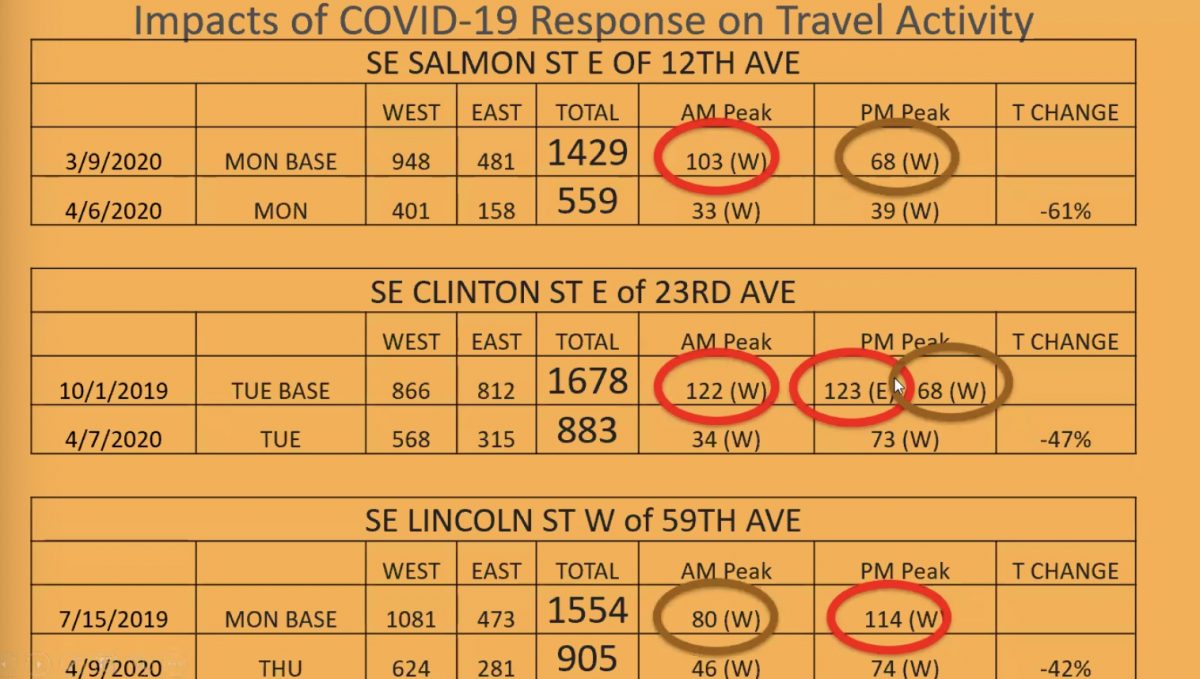
(Source: PBOT)
Eudaly’s Policy Director Jamey Duhamel (who was assigned a much more direct role in bicycling policy just before the pandemic hit) mentioned concerns with having enough maintenance staff to put up and monitor all the new barricades and signs. This is a serious issue because PBOT’s maintenance division (which in some ways – culturally and physically – often feels like a separate bureau) is still only working at half-staff. “We’re waiting to see if that’s a resource we can deploy,” Pearce said, adding that the maintenance division is trying to be fully staffed by next month. Margaux Weeke, communications director for Commissioner Eudaly’s office clarified this morning that they’re working on a “community activation strategy” to maintain the barriers and we can expect more info on that effort soon.
As for how the barricades will be installed with limited maintenance staff, Weeke says they’ve hired the same contractor that puts on Sunday Parkways to do the work.
Asked about using community volunteers to keep the barriers in place, Pearce said he’s discussed the idea with Bike Loud PDX, a local bike activism nonprofit. Another idea PBOT is mulling is some sort of “greenway stewards” program. Perhaps they can enlist the hundreds of “intersection superheroes” that have already volunteered for Sunday Parkways events?
Busy Streets/Main Streets
(Details from PBOT graphics)
The pop-up biking and walking lanes and new loading and queuing zones on main streets and arterials will come later. These will be phased-in by PBOT as demand dictates and/or Governor Kate Brown lifts the ‘Stay Home’ order. Last night Pearce cited lots of uncertainty about this element of the plan, saying PBOT’s goal is to ramp up and be ready to strike when the opportunity arises. “Are we a month out? Are we six weeks out? We don’t really know,” he said.
According to Eudaly’s office these elements of the initiative will be the focus of more formal outreach. “PBOT is going to be flexible and work to identify situations where we can better support safe mobility for Portlanders,” Eudaly’s office shared with us this morning.
Advertisement
It’s All About the Money
While there’s justifiable excitement from PBOT and advocates about this new initiative, looming anxiety about the budget remains. Pearce said last night he’s scouring the agency’s plans for small projects that can be delayed in order to create resources to implement the Slow Streets plan. He made it clear that no funding has been made available for this yet. “I’m operating under a strong imperative to not have this create new costs,” Pearce said. Large capital projects are not on the table: “We’re going to have to be as strategic as we possible in the ways we respond to his… Big infrastructure isn’t the answer,” he said.
When I asked for clarification about funding, Eudaly’s office said since the Slow Streets effort is part of the city’s emergency COVID-19 response, it’s eligible for federal CARES Act funding.
Other Takeaways and Next Steps
PBOT has lacked a unified vision and sense of urgency for a while now. The COVID-19 pandemic might be what gets them focused and working toward all the shared goals we all care so much about. During last night’s meeting it was clear they’re asking the pandemic to do a lot of heavy lifting.
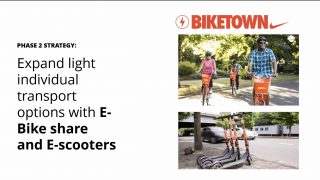
PBOT is going to try and leverage this Slow Streets effort to garner more public support and build momentum around other projects and programs. PBOT’s Ciarlo said last night the biggest barrier to greenway development isn’t engineering or funding, it’s getting public support for the changes. “We really want to seize this as a moment to help the public see these as something for everyone,” she said. Ciarlo mentioned that the pandemic has opened many peoples’ eyes to the value of the street in front of their home. “What we’re intending to do is capture that feeling and help people take what they’re experiencing now and really build on that to create some support for the more permanent installations.”
PBOT will also seize the moment to create streets that help ensure the success of their Biketown re-launch that’s on track for this summer. The new bike share system will be 100% electric and will cover a much larger service area. She also mentioned they want more Portlanders to come out of lockdown and choose “light individual transportation” options like e-scooters. If done right, this Slow Streets initiative encourage more people to bike and use scooters for many urban trips and that new non-driving traffic will build even more support for the ultimate prize: Dedicated bikeways on main streets and arterials.
This all sounds fun and exciting; but there will be opposition and many people will resist these changes. We should also be wary that for all the talk about equity and fairness to people of color and lower-income Portlanders, the issue wasn’t addressed with any substance at the meeting last night. PBOT has ignored this at the outset of “exciting” new plans in the past and I worry they’re setting up to do it again (note that Slow Streets point person Nick Falbo is same planner who ran into major opposition and questions around race and equity on the 7th/9th greenway project).
I look forward to following this closely as outreach begins. For now, PBOT says they want to hear from the public about where changes should happen first and why changes are needed. Please use the 503-823-SAFE hotline (also safe@portlandoregon.gov) and the active.transportation@portlandoregon.gov emails to share your voice.
And stay tuned to BikePortland for more coverage.
— Jonathan Maus: (503) 706-8804, @jonathan_maus on Twitter and jonathan@bikeportland.org
— Get our headlines delivered to your inbox.
— Support this independent community media outlet with a one-time contribution or monthly subscription.



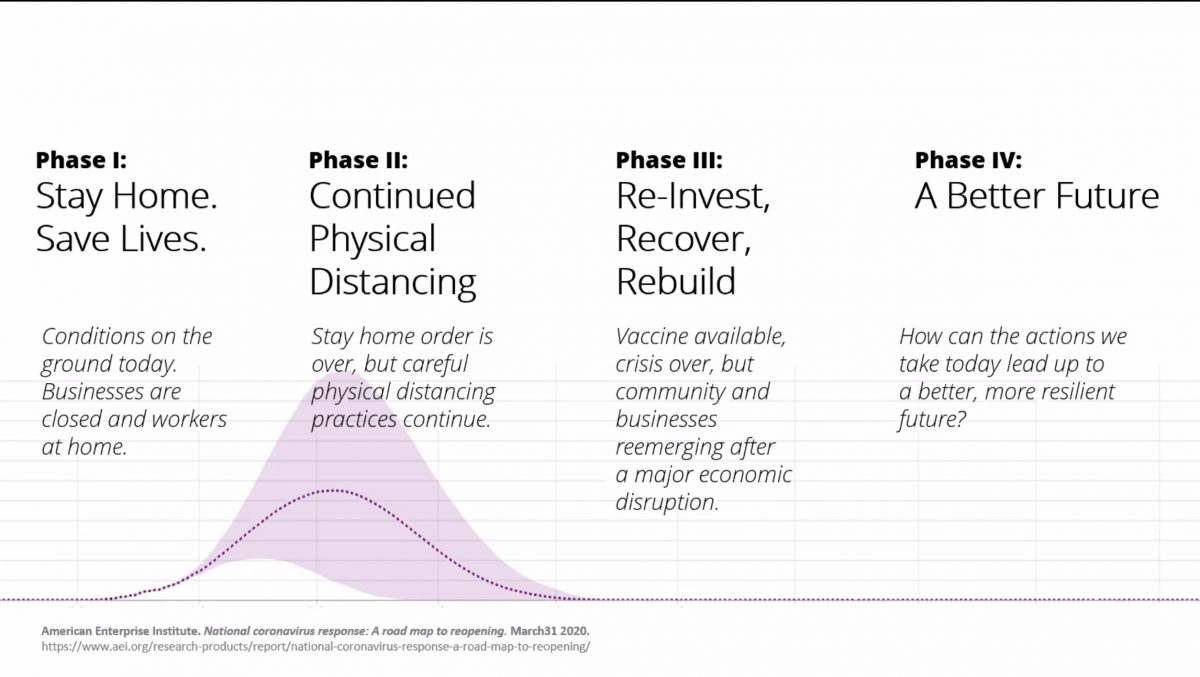
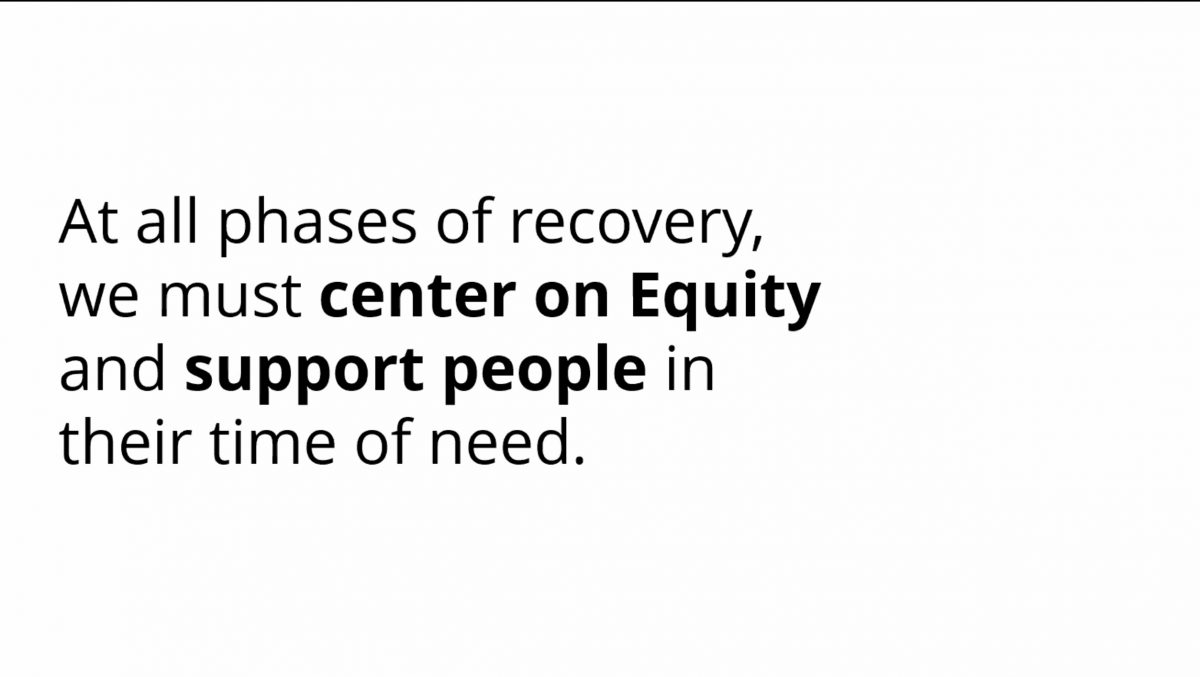

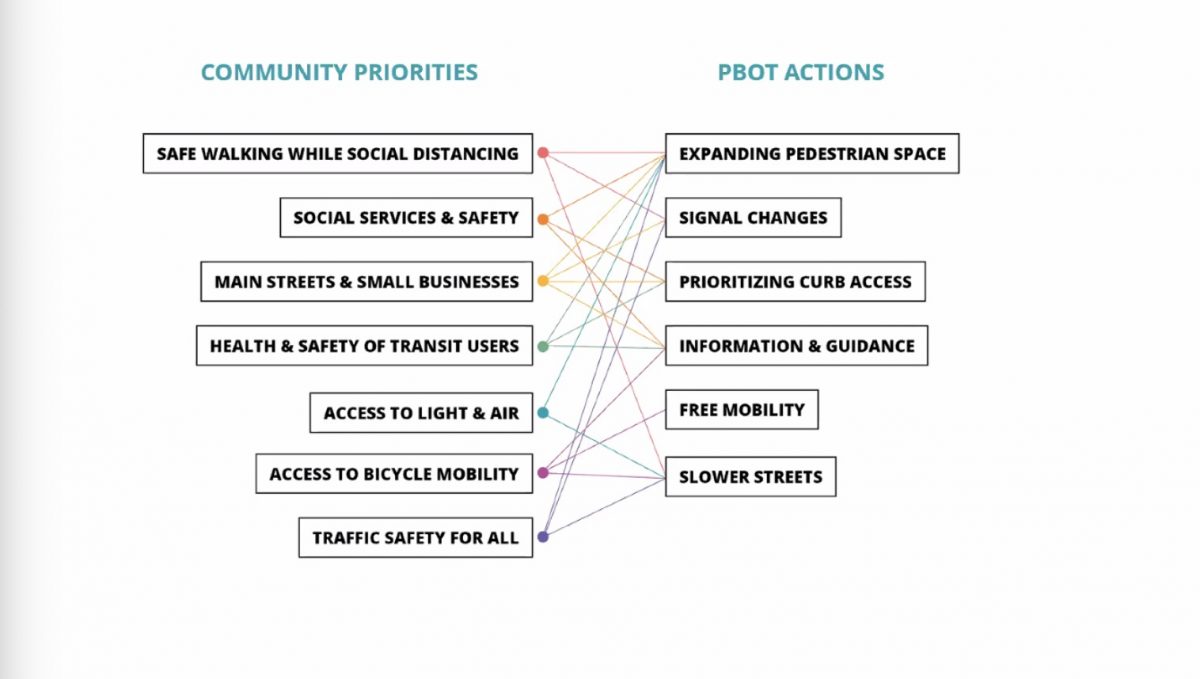
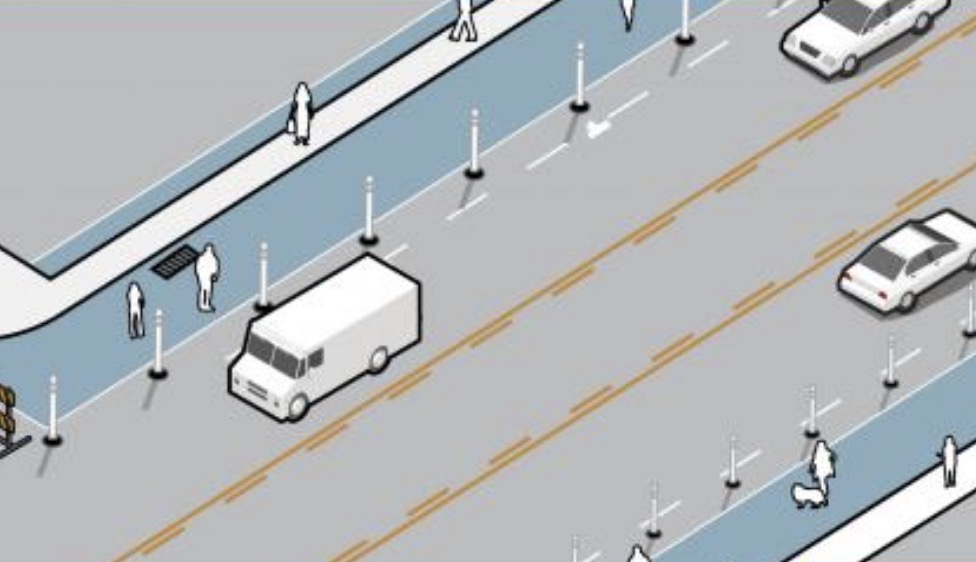
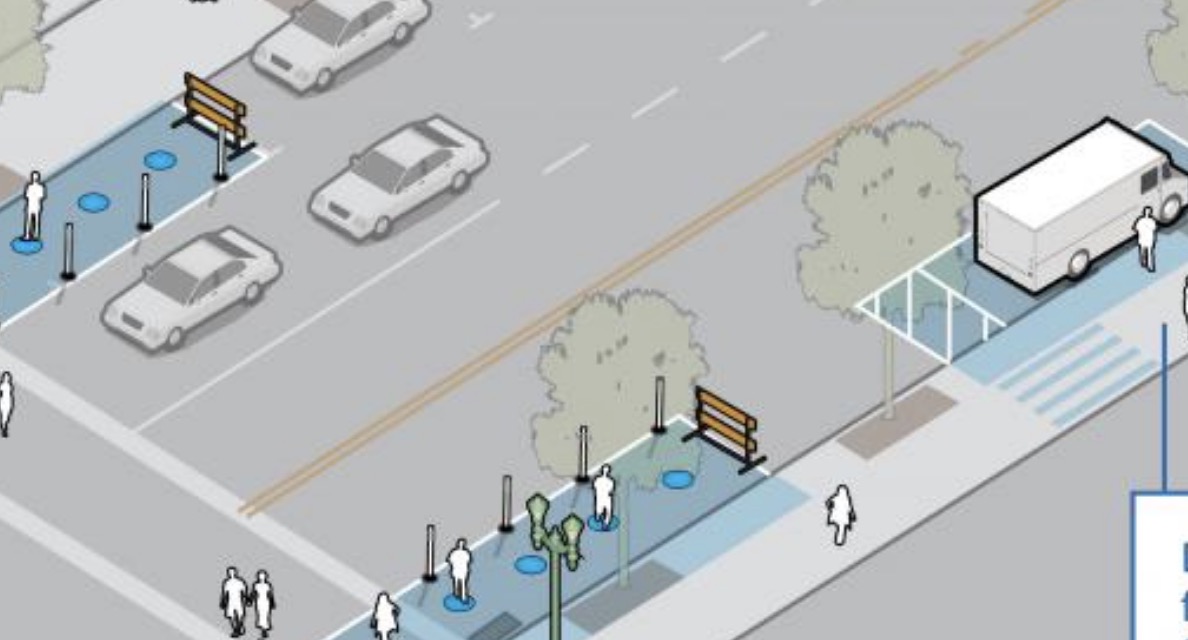
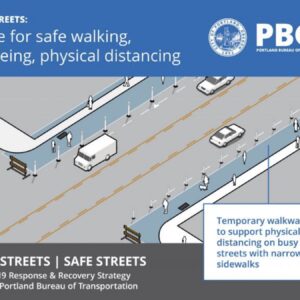


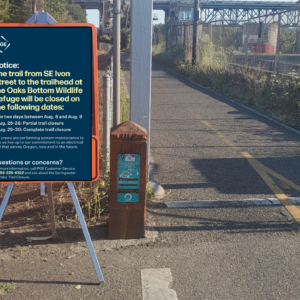
Thanks for reading.
BikePortland has served this community with independent community journalism since 2005. We rely on subscriptions from readers like you to survive. Your financial support is vital in keeping this valuable resource alive and well.
Please subscribe today to strengthen and expand our work.
Thanks, Jonathan. Hopefully PBOT doesn’t forget NW and SW Portland.
And I don’t totally feel great about the article throwing Falbo under the bus at the very end…
PDXCyclist, I’m not sure why you think I “throw Falbo under the bus” when I’m merely stating a true fact. Do you dispute my characterization of what happened? It might not feel good, but I believe it to be true.
I think there was a pretty clear implication in the way you wrote it that if some other planner had been assigned to the project, perhaps it wouldn’t have gone that way. I don’t believe that’s true for a second. Any version of a 7th/9th Ave neighborhood greenway that any PBOT staffer would have taken to that neighborhood would have been met with a similar reaction.
Well I regret that you read it that way. Not my intention at all. I just wanted to point something out.
Nick Falbo is one of the best most experienced and competent project managers PBOT has – he’s typically only assigned to projects that are expected to be controversial, often after some other anonymous staffer has already screwed up.
Yes I agree. Not sure why you’re saying this to me though… as if you have reason to think I believe otherwise?
I like Nick, but I think he has only been with PBOT for something like 2 years- hardly the most experienced planner at PBOT!
We absolutely should be calling out the planners who FAILED to implement a bike lane on NE 7th Ave. This was a complete failure and let down to community cycling activist who worked hard to get it in the plan, only to be dismissed for parking access. If you are a transport planner in Portland and you don’t have the courage to lead the hard conversations with people who need help transitioning to other transport options, you should be furloughed, not given bigger projects. Now this same guy is in charge of the Slow Streets proposal and what we know now is that they are failing to communicate just exactly what we will be getting 100 miles of car free lanes and a new gas tax? Really? Is that what is happening? We are going to get another round of half ass measures that the Karen’s and Becky’s will use to pump up their budgets, resumes and egos.
We don’t need more speed bumps we need a state law structure that actually punishes people for car violence. PBOT doesn’t have the authority to do this nor the courage to communicate the issues. We need statewide leadership and sadly we know that Kate Brown and the democratic machine is hell bent on building MORE freeways. ODOT only got as far as they did at the Rose Quarter is because PBOT got rolled by the democratic money machine. Warner is married to the Senate Democratic Majority, but no conflict of interest here, nope none at all. We can all thank Chloe for that political appointment.
You seem very uninformed.
No bike lane was ever proposed for 7th.
Safety is not partisan, so interspersing your rant with the big D Democrat is another sign of bias and lack of knowledge.
Are you black? Because the insensitivity of your post indicates you presume a right (road space allocation) regardless of history and past transgressions.
Were you involved in the process for the greenway? Your bias again indicates you’re fine when PBOT imposes your will on a neighborhood, but bent out of shape when you perceive they are imposing something you dislike. You might want to consider PBOT works for all Portlanders, not just the ones that choose to move about on two wheels.
Do you work for PBOT? Have you any clue what they advocate for at the legislative level? Speaking of which, what efforts have you made to your representatives to advocate for change?
Paikiala, I spent the last two legislative session volunteer testimony for better active infrastructure in Salem. I was a founding member of bikeloupdx, nomorefreeways and was a founding snowflake leader for Moms Demand Action. My children are sleighted to attend Harriet Tubman Middle School. I live 3 streets down from NE 7th for many years. I’ve sacrificed a lot to develop deep knowledge and transport history in Portland. I’m native from Oregon coast and my voice is repeatedly dismissed by blacker folk then me and it’s getting old.
There was a bikeway proposed in the 2010 NE 7th greenway plan. They absolutely skuttled that project for parking. Stop defending PBOT. I watched the City of Portland send a legislative delegation that stumped for car drivers not cyclits. All they care about is protecting their maintenance fund which is code for old timers who get paid way too much to deliver old school transport plans. I want to you read what Art is saying… he is proposing that unpaid Sunday parkway super heros volunteer to steward and keep our intersections safe. That is the most ducked up solution I’ve heard in a long time. The problem is we don’t have SUV’s or guns or the backing of the State of Oregon to fully prosecute drivers who kill cyclists. Personally insulting or challenging my biases it’s not helpful. Stop defending parking, bad policies and PBOT. A collective organization that has been promising protected bike lanes for decades and now is asking us to protect intersections with our BODIES from reckless drivers. That is not equity.
And I always use my real name on this list because I’m not ashamed of what I’m saying. I’m not paid off by anybody. And I specifically closed the BikeWALK PAC because I didn’t want to deal with the money. My voice is more powerful. Peace out.
“Stop defending PBOT”
We will wait a long time before that happens.
From what I’ve seen, if it’s not east of I-405, west of 82nd, north of Division, or south of Killingsworth, PBOT pretends it doesn’t exist
“not east of I-405” = west of 405
not “west of 82nd” = east of 82nd
not “north of Division” = south of Division
not “south of Killingsworth” = north of Killingsworth
spacial reasoning fail. Your description could be interpreted to mean all of Portland.
presuming you meant a box bounded by 82nd, 405, Killingsworth and Division and nothing provided inside the box:
You would need to exclude traffic calming on:
87th south of Killingsworth, 89th, 91st/Rocky Butte, Fremont Dr, Russell, Tillamook, 87th south of 205 as part of the 80’s greenway that goes past Division, 94th north of Stark, 86th south of Burnside (80’s again), Taylor, Mill (greenway).
Street grading on Lincoln east of 87th was completed this year.
If you also exclude road maintenance.
And ignore any benefit accrued to you for work done outside the box (maybe you never leave the box?).
If people living “outside the box” use streets “inside the box”, then they too benefit from improvements made there. I think it makes sense to prioritize changes to those streets that are used by the most people.
All for more biking infrastructure and safety.
Concerned about more pedestrians in the street though, the increase in joggers on the greenways dying my morning commute since the lockdown, people that aren’t essential workers/unable to work have really been a concern.
Also if PBOT adds speed bumps, hope they put those in with cut outs for bike traffic.
I called PBOT after they installed the full ones on Harrison and they said that cyclists prefer them.
Is that right?
Johnathan, could you conduct a poll on that one of these days?
Thanks!
If you can’t avoid a few joggers in the street, you are going too fast for conditions.
I feel like I’ve had to say this a million times here before, but I will say it again: People are allowed to get exercise outside. Read the stay at home order! It’s in there.
I’m pretty sure PBOT has some imaginary friends who acts as their cyclist advisors. They put in a lot of “bike” infrastructure that is an impediment to biking.
Speed bumps are only necessary because PBOT refuses to actually minimize car traffic on greenways.
Can you provide any evidence that speeding is correlated to the volume of traffic using a street? Otherwise, your imagination is running wild.
Speedbumps are a waste of asphalt. Take the materials and labor up to NE Holman, or any sidestreet E of 82nd if you prefer, and smooth out that mess.
A diverter in the middle of a neighborhood, like the one on NE Rodney near Fremont, will persuade fast people to go elsewhere. No speedbumps required.
It only encourages the speeders from outside the neighborhood to go elsewhere. Most speeding is done by local residents.
“Most speeding is done by local residents.”
I’ve never understood this. Shouldn’t local residents show even greater respect to their own neighbors by honoring the speed limit? I don’t intentionally speed in anyone’s neighborhood, but I feel a special obligation to show extra care to my own neighbors by driving calmly.
Local residents drive through their neighborhood the most, and feel they know all the streets really well. It kind of makes sense they’d go fast. Familiarity breeds impatience.
At a time where PBOT has suddenly lost a lot of revenue, it’s interesting that they’re able to use CARES act funding for this proposal. I wonder if they could that funding for rolling out low cost implementations for various projects that have already had planning work done (i.e. the “In Motion” plans).
The Treasury guidance is pretty restrictive. It says it has to be used for direct (and temporary)
COVID-19 response efforts during the pandemic, and says one example of that are measures that help people physically distance from each other. It can’t be used to address regular maintenance, operations, or planned projects. That’s why this initiative is eligible, because it’s really about giving people an easier time walking or biking in the street, spread out from each other, during the crisis. It would be harder to justify spending it on previously planned projects that are mainly about increasing bike or transit mode share. Hopefully there will be future stimulus measures though, focused on infrastructure, or federal aid to state/local governments that allows replacement of lost revenues.
So, I’m curious: under CARES Act funding, if PBOT hadn’t planned to add a diverter to a greenway, they can; but if they had planned to add a diverter, they can’t?
I can’t see a difference, and they should be able to justify it (if necessary). Diverters both reduce and slow down traffic. They can’t “harden” them with CARES funding, but getting them in place quickly should qualify.
Carpe diem, Art.
Ask your representation in D.C. why back-filling revenue shortfall is wrong, but new work is right.
It was a legitimate question, and if PBOT staff want to weigh in it would be nice if it wasn’t with a snarky question that doesn’t answer the question.
PBOT doesn’t make the rules, but does have to abide by them, so the comment was factual.
Re: it’s all about the money
As some drool over CARES funding, let’s not forget this is simply borrowing on our behalf, at least for the percent who pay meaningful federal taxes. It doesn’t matter if it materializes from the city, state, or feds, as all levels of government have suddenly lost significant revenue and are piling on mountains of debt. As little as it may cost, and as much as I may enjoy the outcome, I still don’t believe this is the best or intended use of CARES funds.
The whole plan feels very opportunistic to me, particularly what’s in the Other Takeaways section of this post. I fear it will be seen by many as an overreach and could very well back fire, causing more harm than good in the long run.
We really don’t need to worry about “paying the money back.” The only real issue with expanding the federal deficit and debt is how high the interest payments are – and the Federal Reserve is committed to keeping interest rates incredibly low, even effectively negative, for this kind of lending during the recovery.
Big deficit spending right now, and for the period of recovery, is our single best economic strategy. The only concern ought to be that it’s used for efforts that will make us better off in the short, medium and long-term. Investment in less dangerous streets and green transportation qualifies!!!
Economists are hugely in agreement on this point.
Agreed, “paying for it” isn’t a major concern at the level we’re spending right now. All this borrowing might have the effect of pushing interest rates up and causing some inflation – but only all else being equal, which it isn’t. If anything, the borrowing is replacing institutional borrowing that has collapsed, and any inflationary pressure is offsetting deflation that may be setting in as the economy contracts so severely. A deflationary spiral is a much greater existential threat to the economy than runaway inflation – in a general sense, and especially right now.
And yes, I pay “meaningful” taxes.
Regarding speed bumps with the bicycle cut outs: They just installed bumps in NOPO on N Willis. For some reason the cut outs are near the centerline in each direction. Two problems: bike riders don’t usually ride that far into the street and worse, the same jerks who were speeding regularly now just drive in the middle of the road! The cut outs are perfectly spaced so their wheels never even hit the bumps. It’s bewildering why the spaced the cut outs that way!
The cut outs are probably for emergency vehicles/ fire engines as a compromise to putting them in.
Most fire trucks have dual rear wheels. The cutouts are not wide enough for dual rear wheels. Secondly, the spacing between the cutouts more closely matches the spacing between the wheels of a passenger car than they do for a dually truck. If it was intended to space the cutouts for fire trucks, it was a design failure.
Armchair engineer, much?
PBOT and the Fire Bureau have been putting in these fire-friendly speed bumps for years now. I think they know how wide the tires are and how far apart the tires are at this point.
I do wish the city would communicate more that most of these are meant for fire response, not for bikes. Of course, the ones on Clinton and Woodward *were* designed for bikes, adding to the confusion, since they look similar.
No. I’m an actual engineer. Licensed in three states. You?
served!
Civil Engineer or Traffic?
You’re still wrong about the cut outs. They are the approved width and spacing requested by Portland Fire and Rescue. I know the engineer (also registered in the three western states) that did the design.
Then please explain (or ask your friend who designed them to explain) why they are much too narrow for duallies to fit?
I have long puzzled over those cutouts… I figured they must be for rain water.
Both. Civil and Traffic.
I have measured the flat pavement of cutouts and found them to vary between 11 to 15 inches.
The tread with of dual wheels on my neighbors flatbed, which I judge to be smaller than a fire truck, measures 22 inches.
Maybe the city has changed it standards. Maybe the Fire Bureau provided incorrect specifications. Maybe the Fire Bureau is content with a less pronounced “bump.” The cutouts on my regular cycling route will not accommodate a fire truck without at least some up-and-over with the rear wheels.
The original design, until last year, had 12 inch wide flat section with 6 inch edge tapers on each side. The intent was to reduce slowing of fire trucks, not eliminate it. 28th was not constructed to that standard. Rear dual wheels were meant to ride up onto the edge tapers in the original design.
Standard speed tables cause about 10 seconds of delay per bump to a fire truck or engine. Speed cushions about 2 seconds.
The new design was requested by Portland Fire and Rescue. The 2019 design update has a 20-inch flat gap with 9 inch edge tapers on either side. Some ride up of the rear dual wheels will still occur, depending on the vehicle.
N Willis has this channel design with a 3-cushion layout. SW Spring Garden and Shattuck have the 4-cushion layout that does not require straddling the centerline. NW 25th will have this channel design with 4 cushions.
3-cushion v 4-cushion is dependent on traffic volume (low v high) and road geometry – mostly lack or presence of curves.
Both designs were approved by Portland Fire and Rescue.
“28th was not constructed to that standard”
You can say that again. I biked over them all this morning, was kind of curious to refresh my memory – and they are all different(!)
Who pays these clowns? Approves of the work, signs off on it?
The cutouts on SE/NE 28th were designed for bikes too.
False.
The only bike friendly specific speed bumps in the city are on Clinton, 26th to 21st, and Woodward, 52nd to 74th.
If not for bikes, what is the purpose of the cutouts on SE/NE 28th?
Emergency responders, but poorly executed.
Maybe they are designed for ambulances and police cruisers? Fires are extremely rare, anyway. Fire trucks are usually responding to medical issues, and are definitely overkill.
OSHA rules require four personnel responding to medical emergencies and ambulances only carry two EMTs. Portland Fire and Rescue is usually the first responder, so an ambulance and truck or engine are always sent.
= probably true but so idiotic.
Who comes up with rules like this?
Mostly just idiots who study workplace injuries and come up with idiotic rules to prevent them. Probably the same idiots who came up with classics like “hardhats on construction sites” and “eye protection when working with caustic chemicals.” I mean, who are these people?!?
I’m sorry, Kitty, but your examples are nothing like this:
“OSHA rules require four personnel responding to medical emergencies and ambulances only carry two EMTs”
The equivalent would be stipulating that the DEQ requiring traffic stops to have three law enforcement personnel present, but because cop cars only carry two the sewer dept. which is issued bigger vehicles are the ones actually doing traffic stops.
Generally speaking, industry resists being told what to do by government regulators, so, generally speaking, when the government does intrude with regulation, there’s a good reason for it.
You don’t know the reason, but you’ve somehow concluded it’s idiotic. Is it at least possible that the folks at OSHA are not utterly incompetent?
“Generally speaking, industry resists being told what to do by government regulators, so, generally speaking, when the government does intrude with regulation, there’s a good reason for it.”
Droll.
And you know this, how?
Besides, we weren’t even talking about ‘industry’ but regulations dictating how public or private services respond to medical emergencies.
“You don’t know the reason, but you’ve somehow concluded it’s idiotic.”
Like you I have something between my ears, and if I use it I can (and do) draw conclusions about what I see, hear, or learn on BikePortland. The point being, on its face what paikiala wrote is crazy in the same way that my example above your last comment is crazy.
“Is it at least possible that the folks at OSHA are not utterly incompetent?”
I can think of many, many government regulations that fail the test you have in mind. It is maddening. Didn’t we just witness a quintessentially boneheaded example finally succumb – the 85th percentile rule? Or how about the one that forbade local jurisdictions from lowering speed limits? I could go on.
Maybe it would make more sense if you parsed the sentence differently: OSHA rules require four personnel responding to medical emergencies. Ambulances only carry two EMTs.
What makes no sense about any of those discrepant staffing levels and vehicle sizes is that in other countries this administrative problem does not exist, fire trucks don’t attend to medical emergencies and sewer trucks don’t respond to traffic incidents. The regulating agencies and the designers of ambulances and everyone in between work out these details in ways that make sense. Clearly (to me) this coordination was not pursued in this case. Which is what gets my dander up,.
I’m not going to defend government regulation in general, but even those last two policies you cited make sense when understood from the viewpoint of those who wrote them. Understanding that makes it easier to change the policies than if you just dismiss them as stupid policies written by stupid people.
As usual, I’ll argue my minoritarian view that more empathy and more understanding, with less dismissiveness and less divisiveness will get better results, faster.
“even those last two policies make sense when understood from the viewpoint of those who wrote them”
That… is a very, very low bar, Monsieur Kitty.
Stephen Miller, no doubt, believes that brown children belong in cages.
So?
I doubt that very much.
My point is that it’s easier to change a policy when you understand why it is what it is. Starting from the position of “your policy is stupid and so are you” makes the burden heavier.
“I doubt that very much.”
You just keep doubting then. https://www.sacbee.com/opinion/editorials/article213484199.html
“My point is that it’s easier to change a policy when you understand why it is what it is.”
I don’t disagree. I’m always curious why things are the way they are.
“Starting from the position of “your policy is stupid and so are you” makes the burden heavier.”
I don’t start from that position. That was my conclusion after exhausting other more generous explanations that didn’t hold water.
Good to see Eudaly finally come around, but she pretty much had to, since Sam and Mingus both outflanked her on this issue.
I hate to sound like an old fart all of the time, but the fact that Eudaly finally did the right thing doesn’t mean she’s an effective leader. I’m glad to see the shift, but the commission form of gov’t is still broken and needs to be eliminated. I’m going to be a single-issue voter in the upcoming election and will vote for any candidate who signs a promise (in blood) to eliminate Portland’s commission-form of gov’t.
And replace it with what? Eugene has a city manager form of government and can’t get anything done either.
Well, then that’d be a failure of the Eugene City government, not necessarily of the form of government. But the current PDX format has serious flaws in how bureaus are run – which is the point. Also, it lacks in democratic representation of under served areas of the city -which is another major issue. We know our current form of city government provides poor outcomes. Why not make a change and see if it improves? What exactly is the risk?
It’s possible to maintain your present form of commission-style government but elect your councilors by district rather than at-large. It’s equally possible to have a city-manager government where your councilors are still all elected at-large or in a mixed combination of at-large and disticts as my community has. In any case, having just 4 councilors and a mayor, all elected at-large to be your effective city manager and 4 assistant city managers works quite well in a town of 6,300 or smaller, but not so good in a growing city of over 630,000 – at a minimum you need a lot larger city council.
I’d like to see a large number of council members elected, perhaps 30 or more, elected from small geographic based districts.
Eugene has better roads, more bike infrastructure and LTD has provided the first two spurs of Bus Rapid Transit. Eugene is far far far far better off than Portland
I love PBOT’s first step, but only focusing on greenways seems pretty limited. In addition to improving greenways so people biking and walking have more safe space, a couple of other minor changes would yield big benefits in my opinion:
1. Get rid of beg buttons and have dedicated crossing time for pedestrians
2. ban right on red to improve safety for people walking in the opposite direction of people driving
3. open up closed crosswalks (SW 2nd and Alder, SE 12th and Madison, etc)
I like the automatic countdown pedestrian signals in DC that give pedestrians up to 60 seconds (20 seconds is more typical) headstart over car drivers at intersections, complete with no-turn on red signs.
Leading pedestrian intervals are rarely more than 5 seconds. Can you point us to a resource?
Anywhere to see the actual plan specifics? I live on the Houghton St. Neighborhood parkway between N Wall and N Portsmouth and am curious how it will be implemented.
If this was hunger games portland will be the city. Nice compliant drones in lockstep. You disappoint any human being.
Weird perspective.
Weird flex, but ok
I feel this is a Hail Mary pass, they can pat themselves on the head, say “welp, we did nothing, but I guess we tried”
typical PBOT
These are all actions that PBOT shoud have been doing all along, instead of folding in the face of a few vocal NIMBY homeowners and businesses.
When did PBOT “fold” on this issue? Eudaly was opposed from the outset.
I mean there have been a long list of great projects from PBOT that eventually got watered down till they didn’t really serve cyclists and pedestrians in any larger sense. Keeping parking on the 28th street project comes to mind. I’m sure others here can cite so many more.
So PBOT is broke while at the same time we have a huge increase in speeding and reckless driving. Shouldn’t those creating the safety issue contribute to paying for its mitigation. A ‘safety impact surcharge’ on speeding tickets could provide funding while reducing the need for the funding at the same time. The surcharge could be variable, with an increasing amount depending on how far above the speed limit the ticket was for. The more dangerous the speeding, the more mitigation the driver will need to provide. All surcharge proceeds could go to PBOT safety projects. If you don’t want to pay the safety impact surcharge, that’s fine, then just don’t speed.
And who, pray tell, is going to be catching speeders?
You confuse PBOT with the City of Portland.
PBOT needs more staff to complete the work it has funding for.
I’m heartened to learn of this much-needed initiative. Thanks to all the BikePortland community who have been patient with PBOT and Commissioner Eudaly in this time of change, to give them a chance to put forth something well-thought out and not simply some copy-cat move on what Oakland and other cities have done. To be done right, this takes careful planning.
I have been somewhat disheartened to see some griping about Eudaly on this blog over the past few weeks because the perception that she and PBOT weren’t moving fast enough. I think this plan demonstrates that she is serious about shifting our broken transportation system, and wants to do it right. It also shows that she keeps an open mind.
I want to encourage all BikePortland readers to give Eudaly your vote. She deserves it. Eudaly is the most progressive voice we have on Council right now. She deserves way more praise than she has received on BikePortland for the Rose Lane initiative. I supported Sam when he was mayor but his time has past. Mingus has some interesting ideas but seems to be playing to the NIMBYs, who are resisting needed change. Please vote Eudaly! We have momentum with her, let’s not break that momentum!
My recall is that Eudaly wasn’t saying PBOT was working on it and it would take time. She said people shouldn’t be pushing her on it given all the other things going on.
March 30: “now is not the time for hastily executed street changes.”
https://bikeportland.org/2020/03/30/pbot-commish-now-is-not-the-time-to-make-street-changes-313070
Meanwhile, Sam Adams and Kiel Johnson pushed for it, Jonathan kept the issue on the front burner, OPB pushed her on it, other cities demonstrated leadership, pressuring Eudaly finally to announce it (though not yet do it).
https://bikeportland.org/2020/04/20/former-mayor-now-council-candidate-sam-adams-thinks-time-is-now-to-create-more-safe-street-space-313779
Glad she finally came around on it. But to give her credit as this approach being intentionally thoughtful instead of pressured into this doesn’t square with the last few weeks.
(Agreed, Eudaly should get a lot of credit for the Rose Lane Initiative.)
I agree with JaredO.
This whole thing was a completely avoidable situation. Eudaly was saying outright jaw-dropping stuff from a person ostensibly committed and knowledgable about reforming streets and transportation in general. Everything from “fear people will congregate” to concerns about speeding being a reason to not tame traffic. And perpetuating the false choice around equity versus safe streets. I mean, she said clearly that she didn’t even see the urgency to do anything. I was really disappointed to hear her views on this stuff. I expected more understanding and leadership. It also didn’t feel good when she (and some of her supporters) threw shade at those of us making noise as if we were nothing more than selfish impatient people who didn’t understand what was going on.
All she had to say from the get-go was (assuming it’s true): “I hear your concerns and we appreciate your advocacy for safer streets. PBOT and my office are watching the issue closely and are working on a plan that we will share as soon as possible. Please stay tuned and email PBOT with your feedback.”
I find it interesting that some people now are dismissing “impatient” activists while saying how much they support the initiative. I mean, do folks really think this would have been announced right now if not for those of us creating pressure to do something? Do you realize PBOT staff (who are mostly fantastic and smart and ready and willing to do stuff) have lots of big and bold plans they’d like to implement and that the only thing that prevents it from happening is political will? I think this Slow Streets thing could have very well sat on a desk for several more weeks (or until Governor lifts “Stay Home’ order) were it not for the pressure put on Eudaly by our community and the media.
To me it feels like PBOT was chomping at the bit to do more/say more but Eudaly’s office kept the door closed. Then for some reason (pressure! facts! awareness!) the door opened and she let PBOT move forward.
Was there any harm in waiting? Yes. I think so. This is going to require a big marketing and behavior change push to really work well. Marketing takes time. Eudaly’s unfortunate statements and resulting silence from PBOT cost us not only weeks of time to create a narrative it also set us back because of the confusion and false narratives it perpetuated. We also have a limited time when the super low-traffic conditions will be present. As people start to leave home and drive more, the political opening to take advantage of fewer cars on the street will close. The clock is ticking. The more we do now to reclaim our streets and the narrative, the better positioned we’ll be to take full advantage.
I like Commissioner Eudaly. Even though I disagree with her handling of this issue, I think she brings a lot of very important qualities to council and I’m glad she’s there.
Stop trying to gaslight us. Her statements from the past few weeks can be easily found. She was dismissive, and it was clear that she couldn’t give this issue her attention. Some people aren’t very good at multi-tasking.
Some people aren’t even particularly good at tasking.
Ted, why would we vote for Chloe again when we have better options?
I voted for her to get Novick out. Heck I donated to her campaign. She is no less petulant than Novick, and I’m so excited there are competent options to replace her.
City of Portland’s plan for everything:
phase 1: collect the underpants
phase 2: ?
phase 3: equity!
I agree that equity should be part of phase 1
I didn’t see Tillamook mentioned. Boy, would it be awesome if they did something to slow/reduce traffic between Williams and MLK.
The speed bumps installed (one to go) and bike box that prevents turns on red not enough? The dominant traffic is eastbound from Vancouver. PBOT
–trying to figure out if I’m too old to get this, or too young to get this.
Did anyone hear Dave Miller’s interview with Chris Warner on OPB’s Think Out Lout this afternoon? I don’t normally listen to OPB, but what a train wreck that was! Mr. Warner, notwithstanding his $140,000/yr salary, didn’t answer a single one of Dave’s excellently researched and articulated questions. Each time Chris Warner opened his mouth I felt like my knowledge of the subject went into the red. How exasperating it must be to work for, with, around people who don’t make sense, can’t talk their way out of a paper bag!
Dave Miller is a gem. He works really hard to ask the core questions; isn’t put off by the usual dodges. He’s no member of parliament, but he’s pretty awesome.
That was a disappointing interview. Warner didn’t sound solid on facts, goals, steps moving forward. Can’t really blame him. Sounds like Eudaly is not very clear, either. Though, when he said “under the leadership of Commissioner Eudaly”, or words like that, it reminded me of Mike Pence praising Trump. Yuck. Best quote was from Falbo in abstentia: “We don’t have to just recover to where we were. We can recover to where we want to be”. How the hell are we going to do that with leadership like this?
Exactly.
“Can’t really blame him”
I guess I don’t feel so generous. If he is just a functionary, is not paid to be smart, think for himself, articulate a vision, figure out how to execute it, why are we, you and I, paying him $140,000 every year?
That is noble and sounds nice. But what evidence do we have that suggests that is actually true? Around here it seems the only way PBOT or ODOT or Kate Brown or BES will do anything, amend their errant ways is through public shaming, (the threat of) a PR disaster.
Please show us *better results, faster* occurring in response to your approach.
Maybe I believe it because that’s the kind of person I want to be.
But we are not talking about you, the kind of person you want to be, we are talking about how the world around us works.
I’m all for making the world a better place, giving others the benefit of the doubt, imagining that things could work better and working toward that…. but in the meantime there is also what we see and hear and experience around us. I was talking here in this thread about that.
This reminds me of the diverters on 16th and Ankeny that were spaced so wide that most cars and pickups can just drive through! Why do the city’s engineers keep producing and signing off on such idiotic infrastructure? How hard is it to do some homework, insist on quality, just get it right?!
Maybe the goal isn’t (and shouldn’t be) to physically prevent all drivers from doing anything that violates the rules. That’s an impossible standard.
It should probably be to discourage people from violating the rules by making it clear what the rules are and requiring a deliberate, conscious decision to violate them. That will work most of the time in these situations, much like one-way streets work pretty well without physical blockades preventing people from driving the wrong way.
So was it idiot engineers who couldn’t figure out how to meet a simple goal, or was it engineers solving a different problem than you think they were?
Please refer back to my comments about OSHA and understanding the situation before calling people stupid.
I feel like you are being willfully obtuse.
If we lived in an idiot-free world I might agree with you, but the fact is that we are surrounded by poor decision making, ill-considered judgments, people who are clearly out of their depths, evidence of the Peter Principle. Have you not noticed this? Do you really make excuses for each and every one of them? When do we get to move past all this? How do we learn from our mistakes with your approach – that excuses all gaffes as ‘solving some other unspecified problems,’ and dissembles when pressed?
“So was it idiot engineers who couldn’t figure out how to meet a simple goal, or was it engineers solving a different problem than you think they were?”
Really?! You are going to just toss this out there?
Please trouble yourself to tell us what the ‘different problem’ they were solving instead is….if you know or can discern what it is. If you can’t then I think you are not arguing in good faith here.
Please describe to us the ‘simple goal’ of which you write.
15th & Ankeny: prevent cars from going straight. Couldn’t be simpler
Speed humps: (apparently, according to you/your engineer pal) slow car traffic, allow dually firetrucks through with less slowing. I have no idea if that is simple, but the premise you have been talking about suggests it is in the design, but the design wasn’t followed?!
Was there any requirement that emergency vehicles be able to continue straight?
15th and Ankeny: deter auto traffic (prevention is impossible – see previous idiot rant) and permit the widest variety of bike user through. Do you recall the previous time you went off on PBOT for the permanent design and were informed about trailer widths and shy distance? Do you recall the flack PBOT got for the temporary diverter pass-throughs that were not wide enough?
Having no idea, I presume you are referring to the incorrect construction on 28th when you refer to a design not followed? I don’t know who accepted that work.
“Do you recall the previous time you went off on PBOT for the permanent design and were informed about trailer widths and shy distance?”
I do recall that conversation. Your discussion of bike trailer widths back then made no sense at all, was a grab bag of smoke and mirrors. The diverter gaps there are nearly eight feet wide! My largest trailer loaded with sheetrock is only 4’ wide, and, going slowly, I can fit between the steel poles on the alley at 32nd & SE Salmon, but sure, give me a little extra width, say 4’6” (I have in all my years of biking with trailers full of construction materials through Portland never seen anyone hauling 4’ wide sheet goods; bike moves being a marked exception). But none of this gets us to 7’10” which is the actual gap width at 15th & SE Ankeny, and you have so far never produced any copy that explains that width. Especially in light of what is surely the first order objective: to thwart cars from going straight.
“prevention is impossible”
Paikiala,
You are blowing smoke. There is no reason for us to be arguing here over too wide vs too narrow at 15th and Ankeny. Both are silly and unnecessary and for reasons only PBOT knows we have now experienced both at this location. As I said in that thread, we have developed standards for a reason. In Germany 140 cm/150cm.
As for 28th, you write: “I don’t know who accepted that work.” Perhaps you can appreciate how we who don’t work for PBOT feel when encountering infrastructure that seems so randomly executed.
The Greenways are 20MPH limits. I see In the article that PBOT is tracking car volumes (which are substantially down) but what are the average SPEEDS the people are driving their cars, that’s what makes it unsafe, not the cars themselves. Is PBOT gathering that info? Has the average car speed on the Greenways changed since 10/1/19?